The Missouri lease agreement details the information regarding the rental of real estate for a stipulated period and financial offering. The paperwork outlines the specifics of the legal commitment and involved parties, including names, contact information, residence address, payment schedule, and duration. Disclosures and conditions designate rules that must be adhered to in order to avoid breaching the contract.
Lease Agreements By Type
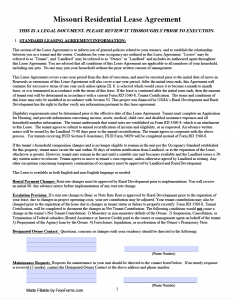 Missouri Association of Realtors Residential Lease – The produced document generated by the organization of realtors to record the pertinent facts of a lease arrangement. The standardized form allows the participating parties to amend the terms and conditions as needed to suit the circumstances of the transaction.
Missouri Association of Realtors Residential Lease – The produced document generated by the organization of realtors to record the pertinent facts of a lease arrangement. The standardized form allows the participating parties to amend the terms and conditions as needed to suit the circumstances of the transaction.
Download: PDF
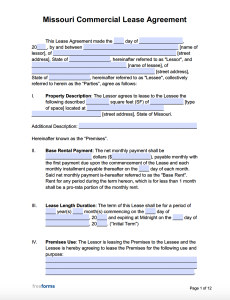 Commercial Lease Agreement – Standardizes the layout of a contract to utilize a space for use by a company to sell goods or services.
Commercial Lease Agreement – Standardizes the layout of a contract to utilize a space for use by a company to sell goods or services.
Download: PDF, Word (.docx)
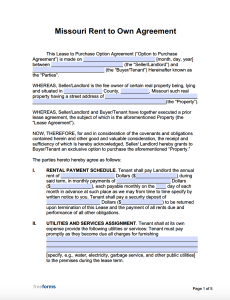 Lease to Own Agreement – Certifies the arrangement to rent real estate for an acknowledged amount of time and dispensed financial sum with the option to purchase at the end of the term.
Lease to Own Agreement – Certifies the arrangement to rent real estate for an acknowledged amount of time and dispensed financial sum with the option to purchase at the end of the term.
Download: PDF, Word (.docx)
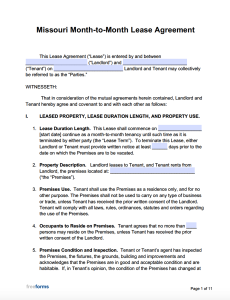 Month-to-Month Lease – Fabricates a written record spelling out conditional specifics to rent a property with an extended cancellation clause with thirty (30) day notification.
Month-to-Month Lease – Fabricates a written record spelling out conditional specifics to rent a property with an extended cancellation clause with thirty (30) day notification.
Download: PDF, Word (.docx)
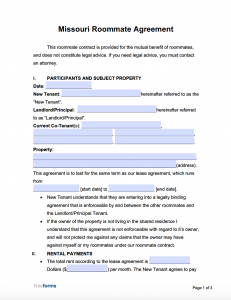 Roommate Agreement – Issues the ability for an individual to sublet a portion of a domicile for a pinpointed time and payment.
Roommate Agreement – Issues the ability for an individual to sublet a portion of a domicile for a pinpointed time and payment.
Download: PDF, Word (.docx)
Standard Lease Agreement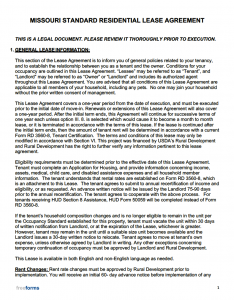 – Furnishes a uniform account of the terms and conditions accompanying a rental agreement for a piece of real estate.
– Furnishes a uniform account of the terms and conditions accompanying a rental agreement for a piece of real estate.
Download: PDF, Word (.docx)
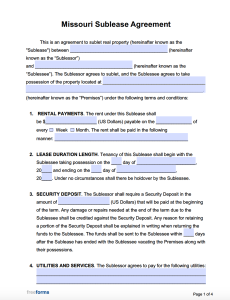 Sublease Agreement – Establishes a determined arrangement for another party to lease a rental unit from an active leasing tenant.
Sublease Agreement – Establishes a determined arrangement for another party to lease a rental unit from an active leasing tenant.
Download: PDF, Word (.docx)
Landlord-Tenant Laws
Further information analyzing the rules and regulations on Landlord and Tenant (§441) and Landlord-Tenant Actions (§535) can be attained by visiting the state online legal archives.
Required Landlord Disclosures
Identification of the Landlord or Authorized Personel (§ 535.185) – All owning individuals and acting administrators of the rental property are to disclose their corresponding names and addresses within the leasing document.
Lead-Based Paint (42 U.S. Code § 4852d) – Homes built prior to 1979 are required to reveal the dangers of lead-based paint exposure. Packets containing information educating tenants on warning signs safety precautions are to be shared with those interested in renting before signing an agreement.
Manufacturing of Methamphetamines on Premises (§ 441.236) – Residential units that have been known to have housed activity contributing to the production of Methamphetamines require sound disclosure of the fact within the lease documentation.
When is Rent Late?
Indication of the due date in which rental payments are to be delivered to the owner is to be followed as expressed in the leasing contract. The state of Missouri does not declare an exact amount of time that is allowed as grace for the tenant to remit payment past the due date.
Late Fees
Late fees are to be assessed as put forth in the written lease arrangement and paid according to the specified payment schedule. There is no set limitation on the amount that a landlord can charge for receiving rent later than defined in the contract.
NSF Checks
Any payment that is returned for reasons of inadequate funding of the issuing tenant is subject to a possible fee of no more than $25. The set maximum fee a landlord can charge is in addition to any fees induced by the financial institution attempting to cash the check (§ 570.120).
Security Deposit Maximum
The upper limit that an owner can ask for as a deposit to secure the integrity of the rental premises is no more than two months’ rent (§ 535.300).
Security Deposit Return
Return of the security deposit minus any costs for repair, cleaning, or unpaid rental payments is obligated to be sent to the tenant within thirty (30) days of completion of the lease term. For occurrences mandating a portion of the deposit is utilized to reimburse the landlord, a list citing each cost is to be delivered with the remaining balance (§ 535.300)
Landlord’s Entry
The legalities surrounding the entering of a residence to provide repair or maintain the building are not explicitly identified in statutes on the state level. For the owner to gain access to a tenant-occupied unit, it is generally suggested that twenty-four (24) hour notice is given.


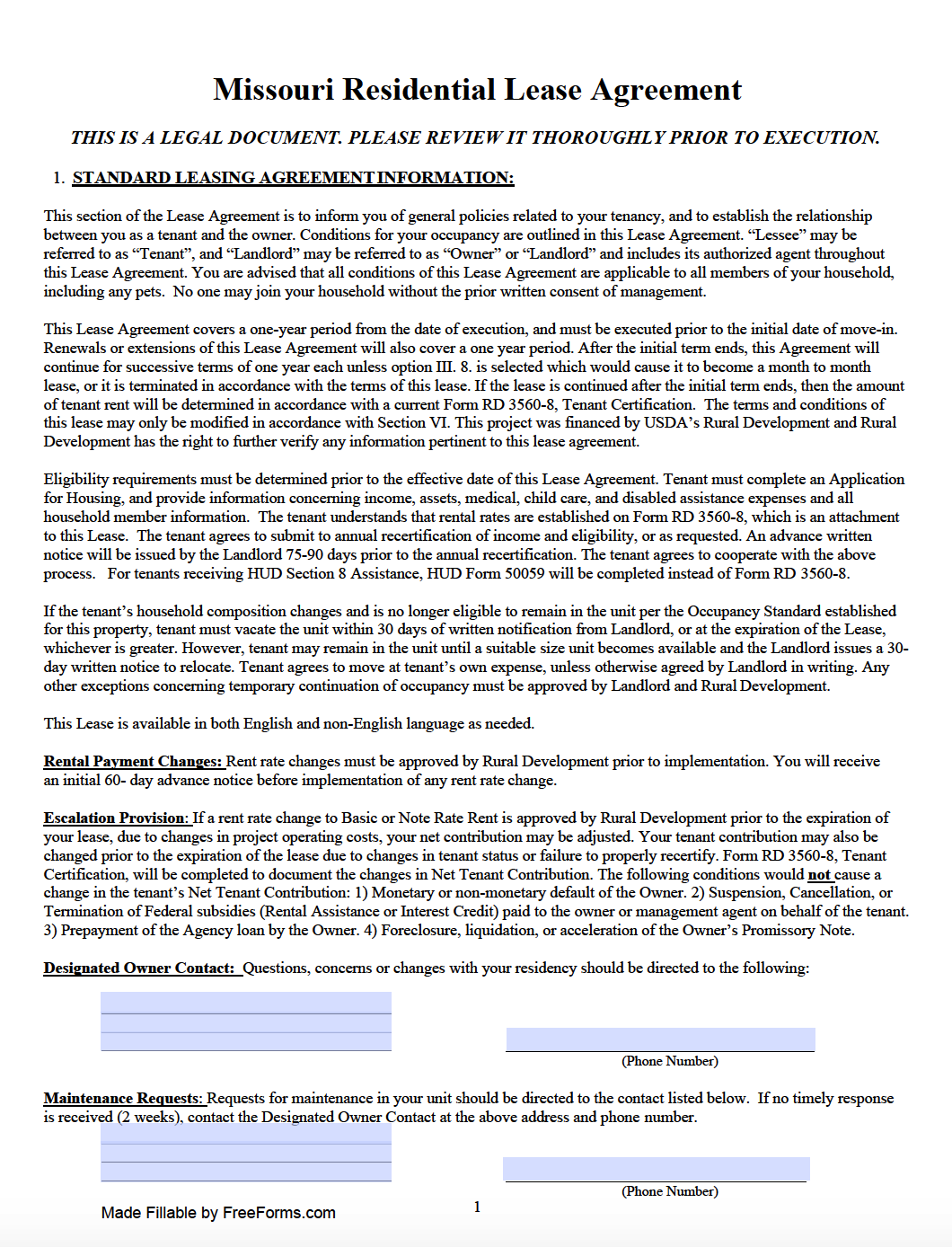
0 comments
Comments are closed.